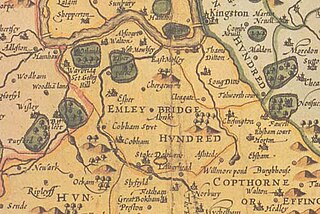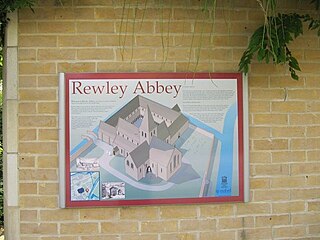Related Research Articles

Bow Brickhill is a village and civil parish in the Borough of Milton Keynes, Buckinghamshire, England. It is a short distance south east of Milton Keynes itself.

Edlesborough is a village and civil parish in the Aylesbury Vale district of Buckinghamshire, England. Edlesborough is also next to the village of Eaton Bray just over the county boundary in Bedfordshire, about 3 miles (5 km) west-south-west of Dunstable.

Ludgershall is a village and civil parish in the unitary authority area of Buckinghamshire, England. It is near the boundary with Oxfordshire, about 5.5 miles (9 km) south-east of Bicester and 5 miles (8 km) west of Waddesdon.

Pitchcott is a village and civil parish in the Aylesbury Vale district of Buckinghamshire, England. It is about 3 miles (5 km) northeast of Waddesdon, slightly less than 4 miles (6.4 km) south of Winslow and slightly more than 4 miles (6.4 km) north of Aylesbury. It is in the civil parish of Oving.

Wotton Underwood is a village and civil parish in the Buckinghamshire Unitary Authority, about 7 miles (11 km) north of Thame in neighbouring Oxfordshire.

Mavis Enderby is a hamlet and civil parish in the East Lindsey district of Lincolnshire, England. It lies in the Lincolnshire Wolds, 4.5 miles (7 km) east from Horncastle.
Statute merchant and statute staple are two old forms of security, long obsolete in English practice, though references to them still occur in some modern statutes.

Aubrey de Vere, 10th Earl of Oxford was the third son of John de Vere, 7th Earl of Oxford and Maud de Badlesmere, daughter of Bartholomew de Badlesmere, 1st Lord Badlesmere.

Eleanor de Bohun was the elder daughter and co-heiress, of Humphrey de Bohun, 7th Earl of Hereford (1341–1373), by his wife Joan Fitzalan, a daughter of Richard FitzAlan, 10th Earl of Arundel and his second wife Eleanor of Lancaster.

Hinton Admiral is the estate and ancestral home of the Tapps-Gervis-Meyrick family and located in the settlement of Hinton, near Bransgore in Hampshire, England. It is a Grade 1 Listed building.
Ralph Ergham was the English bishop of Salisbury from 1375 to 1388, and then bishop of Bath and Wells from 1388 to 1400.

Sir Arnold Savage of Bobbing, Kent was the English Speaker of the House of Commons from 1400 to 1402 and then again from 1403 to 1404 and a Knight of the Shire of Kent who was referred to as "the great comprehensive symbol of the English people".

The Hundred of Elmbridge or Elmbridge/Emley Hundred was a geographic subdivision in the north of the county of Surrey, England. The majority of its area forms the modern Borough of Elmbridge, with the remainder forming part of the Royal Borough of Kingston upon Thames in Greater London.
Robert Tideman was a medieval Bishop of Llandaff and Bishop of Worcester.

High Ongar is a village and civil parish in the County of Essex, England. It is located a mile (1½ km) north-east of Chipping Ongar, 8 miles (13 km) west of Chelmsford and 6 miles (10 km) north-west of Brentwood.

The Cistercian Abbey of Rewley was an Abbey in Oxford, England. It was founded in the 13th century by Edmund, 2nd Earl of Cornwall. Edmund's father, Richard, 1st Earl of Cornwall, founder of Hailes Abbey, had intended to establish a college or chantry of three secular priests to pray for his soul, but his son Edmund substituted 'six Cistercian monks, having more confidence in them.' If this was the original plan, it was soon enlarged. In 1280 he offered the general chapter of the Cistercian order to found a college (studium) for Cistercians at Oxford, and the chapter accepted the offer, and decreed that the college should have the same privileges as the college of St. Bernard at Paris, and that it should be under the Abbot of Thame, as the other was under the Abbot of Clairvaux. The following year the chapter decreed 'out of due respect to the Earl of Cornwall' that the Abbot of Thame should be empowered to appoint an Abbot of his own choice for the house of study at Oxford, and that there should be a daily memory of the late Earl of Cornwall at Mass at the college (studium) of Oxford, according as the Abbot of the place shall ordain.

Charley Priory was a small former priory in Leicestershire, England.
Sir Bernard Brocas was an English knight, landowner and administrator who was executed for his part in the Epiphany Rising.
The town of Calais, France, was in English hands from 1347 to 1558. During this historical period the task of the treasurer, in conjunction with the Captain of Calais, was keeping the defences in order, supplying victuals and paying the garrison. The treasurer was responsible for raising revenue from the Company of the Staple of Calais, which was required to contribute towards the expenses of defence.
Sir Drugo Barentyn, sometimes spelled as "Drew", "Dru", "Barentine" or "Barrington", was an English goldsmith and politician who served twice as Lord Mayor of London.
References
- ↑ Plea Rolls of the Court of Common Pleas: CP 40/541; year: 1401; National Archives, via the Anglo-American Legal Tradition website; image: http://aalt.law.uh.edu/AALT2/H4/CP40no561/aCP40no561fronts/IMG_0541.htm ; 4th entry, seen spelt as "Randulphe";
- Lipscomb, George. The history and antiquities of the county of Buckingham (1847).